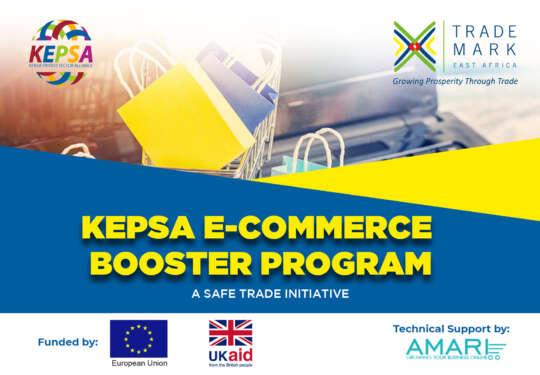The Kenya Private Sector Alliance (KEPSA) on Thursday, February 25 launched an Ecommerce Booster Program targeting at least 2000 Micro, Small and Medium-sized Enterprises (MSMEs).
The program will be realized through funding from the European Union and UK’s Foreign Commonwealth Development Office.
TradeMark East Africa, a leading aid for trade regional body in East Africa will support the program, while the technical support for this program is being provided by Amari Consulting Ltd.
Types of businesses targeted
Businesses with little or no digital presence are being targeted for training and on-boarding to e-commerce platforms to ensure MSMEs can increase and diversify their revenue streams during this period of COVID-19 pandemic.
As COVID-19 pandemic continues to cause disruptions in the global and regional value chains, it has become clear that e-commerce is an important tool and solution for businesses and
consumers.
E-commerce can support small businesses in reducing their costs and effectively reaching their customers; it is an economic driver for both domestic growth and international
trade thus making economies more competitive.
Challenges to be solved
The COVID-19 pandemic has occasioned a spike in business-to-consumer (B2C) online sales and an increase in Business-to-Business (B2B) e-commerce.
The increase in B2C sales is particularly evident in online sales of medical supplies, household essentials and food products.
As a result, attention has been drawn to several challenges hindering the full potential of e-commerce across countries.
Also Read: Jumia Stock Price: Why investors may be losing out?
These include price gouging, product safety concerns, deceptive practices, weak delivery logistics, cyber security concerns, exceptionally low consumer digital trust, low basic ICT knowledge by businesses and customers, weak interoperability of payment systems, the need for increased bandwidth, universal connectivity and affordability of internet, and development-related concerns.
The six month long initiative will build the capacity of MSMEs to engage in e-commerce and digital marketing as well as create linkages for domestic and cross-border trade.
Program’s objectives
The program will aim at helping SMEs gain the digital skills necessary to engage in a digital economy and improve livelihoods.
It will also offer support to SMEs in the wholesale and retail sector with little or no e-commerce presence to get on board e-commerce platforms to increase and diversify revenue streams during the COVID-19 period.

Kenyan SMEs will also be supported to expand their local and cross-border e-commerce presence.
The program will also build capacity of SMEs to raise their proficiency in implementing effective digital campaigns, and increase their brand awareness, value and sales conversions across multiple digital channels.
In her opening remarks, KEPSA CEO, Ms. Carole Kariuki Karuga said that in addition to the e-Commerce Booster Program, KEPSA will seek further engagements on the e-Commerce
Policy.
Also Read: Inside the booming business of digital news curation
“When Covid-19 hit in early 2020, it re-awakened the digital revolution amid lock-downs, curfews and work from home arrangements. Internet usage surged along with online shopping, social media use, virtual meetings and streaming of online content. Business-to-consumer (B2C) and business to business (B2B) sales spiked for businesses that were able to provide their products/services through online platforms.” Ms Karuga said.
Speaking during the launch, the Cabinet Administrative Secretary Chief Administrative Secretary, Ministry of Industrialization, Trade & Enterprise Development Mr. David Osiany, who was the chief guest commended KEPSA for rolling out the initiative.
“One of the many key strategies the ministry is putting in place is development of local talents and roll out of government incentives to make end products cheap with the need for ICT to
our enterprises becoming even more critical. As the government, appreciate our partners, Trade Mark East AFRICA, European Union and Foreign, Commonwealth & Development Office
or the continued cooperation in this mandate.”
Giving his remarks before the launch of the event, TMEA CEO Frank Matsaert commended KEPSA and reiterated his organization commitment to support businesses in Kenya and the region.
“COVID-19 has accelerated the shift towards a more digital world and changed how we conduct business, and this is likely to last. By equipping local businesses with the skills for a new world, we will ensure that Kenya and even the region seize opportunities offered by digitalisation as one of the responses to the pandemic recovery,” he said.
Also Read: Why African countries should consider setting up post-COVID clinics
According to TMEA Kenya Country Director, Ahmed Farah HSC, E-commerce is now a key complementary sector that will enable industrialisation- one of the government Big 4 Development agenda- to take off.
“E commerce provides ways of not only marketing but also for businesses to provide the produced goods effectively to the rest of the world. Supporting the private sector to increase its competitiveness is at the core of TMEA work in the country. We believe this combined approach will contribute to the agenda of creation of jobs, improving incomes, fighting poverty,” he said.











